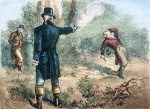This entry is largly concerned with Law Professors but from its pages the reader will learn little about this unique sub-species and much about the infantile mind of the writer.
The biggest drawback to attending law school is spending three years with 200+ people who want to be lawyers. The second biggest drawback is contending with that unique creature, the Law Professor.
Someone once said that there are only eight plots in fiction. This hold true for law professors. There are only eight law professors. Here are four of them.
Professor A
Professor A* spent too much time watching the 'Paper Chase'. He is always impeccably tailored and his facial muscles have atrophied into a perpetual frown that nothing short of surgery will correct. If Professor A ever laughs, it is at cocktail parties when a colleague utters a pun about the Erie Doctrine (so the first judge says, "I said Erie Doctrine, not eerie doctrine").
When Professor A is not lecturing, he is conducting research for his next law review article, 'Where to Place the Semi-Colon in Article 7(A)(1)(b) of the new Romanian Penal Code". Professor A is a tough grader, loves the Socratic method and is always male. Here's a typical exchange between Professor A and a 1L.
Professor A: Ms. Cooper! Is the decision in Hadley v. Baxendale essentially a product of historical circumstances, particularly the peculiar state of industry in the Britain of the 1850's?"
Ms. Cooper: Ummm...Yes.
Professor A: Then how do you reconcile the fact that the principles adopted in Hadley also appear in Pothier's Traite des obligations, first published in 1761?
Ms. Cooper: I need to poop.
Professor A's usual habitat is the Ivy League. However, scandal will cause Professor A to migrate to second and even third-tier schools.**
Professor B
Professor B is the young, hip professor who aches for tenure like a priest aches for an alter boy. He dresses casually, often has facial hair,*** ignores the Socratic method and will generally whore himself for good student evaluations. Initially, students love him, until they realize he's a dork. Professor B is invariably a male. In college, Professor B was an avowed Marxist until he learned there was no money in it.
Professor B has causes and not a class goes by that he doesn't drop hints about his political positions. Professor B's politics are almost always left of center. This annoys the clique of uptight ex-frat boys that are included in every law school class. Here's a typical exchange.
Professor B: The Clean Air Act was one of the most important and effective pieces of legislation to help safeguard our environment. Reagan and Bush have been dismantling it over the course of two decades. Mr. Scott, who hates clean air?
Mr. Scott: Reagan and Bush.
Professor B: Who else?Mr. Scott: All Republicans?
Professor B: Exactly!
Professor C
Professor C is also an impeccable dresser. She looks stern but generally ends up being quite friendly. Professor C is always female and extremely classy and gracious. This professor has the rare ability to explain difficult legal concepts with clarity. She also speaks English when explaining those concepts. She conducts pre-exam reviews where the topics are spoon-fed to the students. She's a fair grader, and rare.
Professor D
Professor D is the spoon-feeding adjunct who actually works in the same field that he teaches. Professor D wants to get home, regrets having taken a teaching position that keeps him out until 9:00PM, and tells you exactly what will be covered on the exam. Professor D does not care about class participation. Professor D is popular and the class is always registered to capacity but rarely filled.
Professor D: That's all you'll need to know about stockholder derivative suits.
Mr. Jones: I have a question.
Professor D: You're kidding, right? You know I don't allow questions after 8:45PM.
You will meet these professors, and four more, during your law school career. Many will seem hard and implacable during class and unapproachable outside of class. Keep contact to a minimum, study hard and obtain as many compromising photographs as possible and you'll be fine.
* Not his real name. Professor A merely represents a genus of law professor.
** Law schools are ranked by tiers in the United States and by height in Europe.
*** This is true even in the rare instance when Professor B is female.

